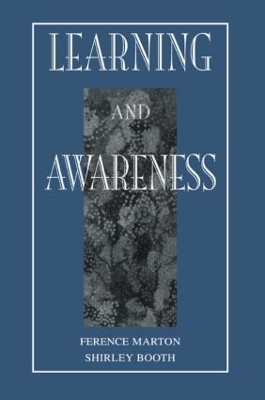
Learning and Awareness
Seiten
1997
Routledge (Verlag)
978-0-8058-2455-1 (ISBN)
Routledge (Verlag)
978-0-8058-2455-1 (ISBN)
This book presents the psychological basis, methodology, and application of Marton's phenomenographic approach to the theory of learning.
This book stems from more than 25 years of systematic research into the experience of learning undertaken by a research team trying to account for the obvious differences between more or less successful instances of learning in educational institutions. The book offers an answer in terms of the discovery of critical differences in the structure of the learner's awareness and critical differences in the meaning of the learner's world. The authors offer a detailed account of the empirical findings that give rise to theoretical insights, and discuss the particular form of qualitative research that has been employed and developed.
The form of learning that is the object of study is considered to be the most fundamental form -- namely a change in the learner's way of seeing, experiencing, handling, and understanding aspects of the world. The need for rigorous analysis of learning of specific subject matter, the individual construction of knowledge, and its social and cultural embeddedness -- the defining features of rival approaches into research on learning -- are reconciled from the approach adopted here into an intertwined and whole experience of learning. The learner's experience is always one of learning something, in some way, and in some context; by holding the learner's experience of learning as the focus of study throughout -- and not studying the learning of the content and the acts and the context as separate and distinct focuses -- the content, the act, and the context remain united as constituents of the learner's experience.
By empirically revealing critical differences in the ways of experiencing these aspects of learning, and by developing a theoretical framework for the dynamics through which change comes about in the learner's awareness, this book gradually leads the reader to a powerful new view of learning. Equipped with the analytical tools and conceptual apparatus to be found in this book, the reader will be empowered to learn and to assist others to learn by creating environments conducive to the most fundamental form of learning: experiencing aspects of the world in new ways.
This book stems from more than 25 years of systematic research into the experience of learning undertaken by a research team trying to account for the obvious differences between more or less successful instances of learning in educational institutions. The book offers an answer in terms of the discovery of critical differences in the structure of the learner's awareness and critical differences in the meaning of the learner's world. The authors offer a detailed account of the empirical findings that give rise to theoretical insights, and discuss the particular form of qualitative research that has been employed and developed.
The form of learning that is the object of study is considered to be the most fundamental form -- namely a change in the learner's way of seeing, experiencing, handling, and understanding aspects of the world. The need for rigorous analysis of learning of specific subject matter, the individual construction of knowledge, and its social and cultural embeddedness -- the defining features of rival approaches into research on learning -- are reconciled from the approach adopted here into an intertwined and whole experience of learning. The learner's experience is always one of learning something, in some way, and in some context; by holding the learner's experience of learning as the focus of study throughout -- and not studying the learning of the content and the acts and the context as separate and distinct focuses -- the content, the act, and the context remain united as constituents of the learner's experience.
By empirically revealing critical differences in the ways of experiencing these aspects of learning, and by developing a theoretical framework for the dynamics through which change comes about in the learner's awareness, this book gradually leads the reader to a powerful new view of learning. Equipped with the analytical tools and conceptual apparatus to be found in this book, the reader will be empowered to learn and to assist others to learn by creating environments conducive to the most fundamental form of learning: experiencing aspects of the world in new ways.
Marton, Ference; Booth, Shirley
Contents: Prologue. Acknowledgements. What Does It Take to Learn? Qualitative Differences in Learning. The Experience of Learning. Revealing Educationally Critical Differences in Our Understanding of the World Around Us. The Anatomy of Awareness. The Idea of Phenomenography. Learning to Experience. A Pedagogy of Awareness. Epilogue.
| Erscheint lt. Verlag | 12.4.1997 |
|---|---|
| Reihe/Serie | Educational Psychology Series |
| Verlagsort | New York |
| Sprache | englisch |
| Maße | 152 x 229 mm |
| Gewicht | 440 g |
| Themenwelt | Geisteswissenschaften ► Psychologie ► Allgemeine Psychologie |
| Geisteswissenschaften ► Psychologie ► Pädagogische Psychologie | |
| ISBN-10 | 0-8058-2455-3 / 0805824553 |
| ISBN-13 | 978-0-8058-2455-1 / 9780805824551 |
| Zustand | Neuware |
| Informationen gemäß Produktsicherheitsverordnung (GPSR) | |
| Haben Sie eine Frage zum Produkt? |
Mehr entdecken
aus dem Bereich
aus dem Bereich
Techniken der Verhaltenstherapie
Buch (2024)
Julius Beltz GmbH & Co. KG (Verlag)
CHF 48,95


